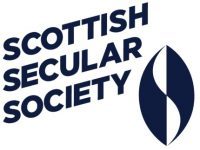The Scottish Secular Society call upon the Scottish Government to recognise the rapid decline of religion in our society and realign our laws to reflect this attitude.
The evidence is in – Scotland has left its religious past behind.
As yet another survey, this time conducted by the Humanist Society Scotland, shows that a majority (74.2%) consider themselves “not religious”, the gap between the law, public institutions, and the people of Scotland grows ever-wider.
The Scottish Secular Society (SSS) are calling on Scottish politicians to recognize the rapid decline in religious affiliation in Scottish civil society.
Megan Crawford, Chair of the SSS, states:
“It is clear that religious privilege remains deeply-embedded in Scottish life, with even the Scottish Parliament and local councils bowing the knee at kirking ceremonies, local authorities forced to admit unelected, primarily Christian, religious representatives to education committees, and children given no choice to exclude themselves from forced religious indoctrination in schools. With an ever shrinking minority of Scottish people considering themselves religious, it is imperative that the laws reflect this, and regular reviews of religious privilege within policy be abolished.”
The SSS stand for both freedom of religion and freedom from religion, and now seek urgent realignment of the legal and civic institutions of Scotland with the true sentiments of the people of Scotland.
Therefore, we are calling on the Scottish Government to do the following:
- Remove the mandatory requirement for religious representatives from education committees and open all seats to the electoral process;
- Prevent publicly-funded schools from involving religious indoctrination, rather focusing on informing students about the varieties of belief and philosophy that humans have adopted over the ages;
- Respect the rights of the child and allow students, of their own volition and without penalty, to remove themselves from religious instruction or religious assemblies;
- Prohibit the expenditure of public funds, including on members’ expenses, on civic religious ceremonies such as kirkings.



